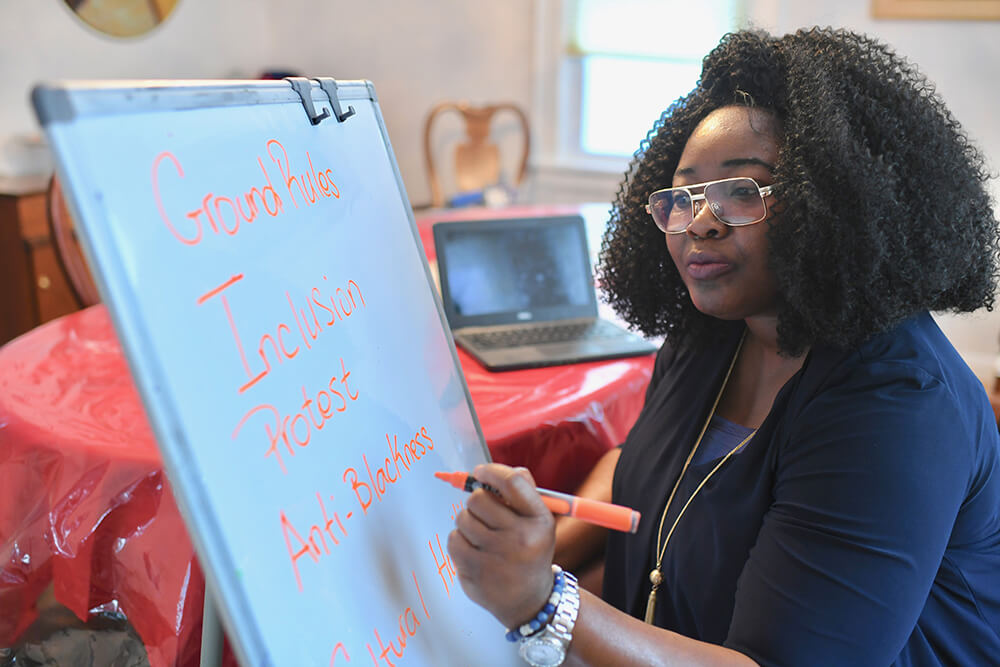The Good Fight
Professor Shakira A. Kennedy Creates Teachable Moments for Social Work Students

Assistant Professor Shakira A. Kennedy has more than two decades of experience working with children, families and adults. Her focus has centered on racial equity and social justice. Dr. Kennedy discusses how the Graduate School of Social Work is responding to the COVID-19 pandemic.
You have much experience working with patients diagnosed with mental illness and HIV/AIDS. How does mental health and physical health affect each other, particularly in these pandemic times?
Stress on the body or within the environment has a tremendous impact on one’s overall well-being. Since the mind and body are interconnected, there is a reciprocal effect on how the mind and body work to cope with environmental stressors. For example, a social worker at a nursing home might work 40+ hours a week with little sleep. Then add the environmental stress of COVID-19 coupled with extensive losses—as seen within these environments. The social worker also would be worried about the patients, and fearful of contracting the virus, while being exposed to trauma several times a day. Such stress can lead to serious physical health problems such as high blood pressure, weakened immune system, obesity and even premature death.
While we are training our students to take care of vulnerable populations, we need to encourage them to find alternative or creative ways to engage in self-care, while living in an environment that is under duress.
How are people of color affected differently during this time?
The pandemic has impacted BIPOC (Black Indigenous People of Color) communities the most. It has pulled the curtain back on racism, health care access, service industry employment and class inequities, while magnifying the social justice disparities. A person can have underlying health issues, live within a dense community, be an essential worker, lack access to health care, all while facing racism. This intersectionality contributes to the impact of COVID-19 within these communities.
Do you teach about social justice in your classes at GSSW?
All incoming graduate social work students are required to take a course entitled “Identity and Social Justice.” This course takes students through an historical journey of various oppressed identities and challenges them to think beyond the status quo in order to dismantle systems of oppressive practices. This is not an easy course; it requires you to be open and pushes you into an uncomfortable place.
When teaching the Identity and Social Justice course, what are some “aha” moments students experience?
Some arrive at this moment during the first opening activity, “who are you?” Students are asked “who are you?” three times and each time they are expected to respond. There are some students who are not sure what to answer after the first time the question is asked, as they begin to do some introspective work of asking themselves “who am I really” or “am I who I say I am” or “am I what people say I should be.” If we think about it, how many times are you asked this question and provided an opportunity for true reflection? Other “aha” moments have come by listening to other students’ experiences around oppression or when learning to name the various oppressive practices that have been endured. When students have their “aha” moment in this course, it is sure to be not only identity-affirming, but also life-changing.
How are students responding to the pandemic?
Students have gotten creative within their internships. Many students are providing telehealth counseling and facilitating virtual clinical groups, while helping to bring COVID-19 testing to clients within their communities. Students have also organized food drives and clothing drives while providing social action advocacy for people in need.
Are today’s students different from previous years and, if so, how have you adapted your teaching?
Since the murder of George Floyd, there has been an overall request for Diversity Equity & Inclusion training from various organizations and/or individuals that do this work. To keep up with the changing landscape for equity and justice, the school updated the Identity and Social Justice course syllabus to ensure students have the context around terminology and individual experiences through a social justice framework. The course provides students with an opportunity to express their emotions about assigned readings, course videos and class discussions using open mic sessions, which turns into a powerful self-expression of artistry. The feedback has often been positive, as students often cite the journey of self-discovery contributing to a deeper level of awareness for themselves and others.

